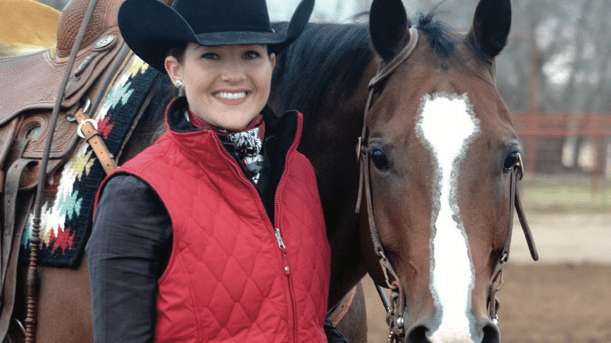Dream job.
For horse-crazy kids, being a professional horse trainer can seem like a dream job, spending all day every day riding, grooming and working with horses.
But hard work, building experience and even education away from the barn are all important factors to building a viable training business. Three former AQHYA leaders share what they’ve learned – beyond horses – since turning pro.
1. Absorb All You Can as a Youth
All three women grew up with parents who were trainers. But they will all tell you that growing up as a trainer’s kid didn’t automatically make them good trainers.
AQHA Professional Horsewoman Dakota Diamond Griffith of Hilliard, Ohio, is the daughter of Sid Griffith, respected reining trainer and judge for multiple associations, and she grew up showing AQHA as a youth.
As a teen, Dakota rode with Rick Skelly of Janesville, Wisconsin, among other trainers, and she loved his Select clients.
“At 15, I used to tell all of his ladies that I wanted a barn of Select riders just like Rick (had),” Dakota says. “So when I was 18, I decided to switch to becoming a professional.”
AQHA Professional Horsewoman Carli Pitts of Newburgh, Indiana, started riding at age 7, showing at the local level, eventually winning national titles. She was part of Team USA at the 2014 American Quarter Horse Youth World Cup. In 2015, she began showing in open classes while she was still a youth.
“I decided before I got out of youth that I wanted to be a trainer,” Carli says. “Both of my parents are trainers, so it’s definitely a lifestyle. And I love learning the horse’s personality – it’s amazing how different each horse’s personality is.”
Carli’s parents are Vicki Pitts and AQHA Professional Horseman Brad Pitts of Newburgh – owners and operators of P5 Equestrian. But having trainer parents isn’t a guarantee of learning everything about the business.
“I wish I’d understood sooner that training is not only getting a horse to ride so that it will show for you, but getting the horse ready for someone else – not just for yourself, but for your youth or amateur clients,” Carli says. “That was the biggest thing they told me, but I didn’t realize how hard it was until I was on my own.”
CLICK HERE to read the rest of the article from AQHA.









